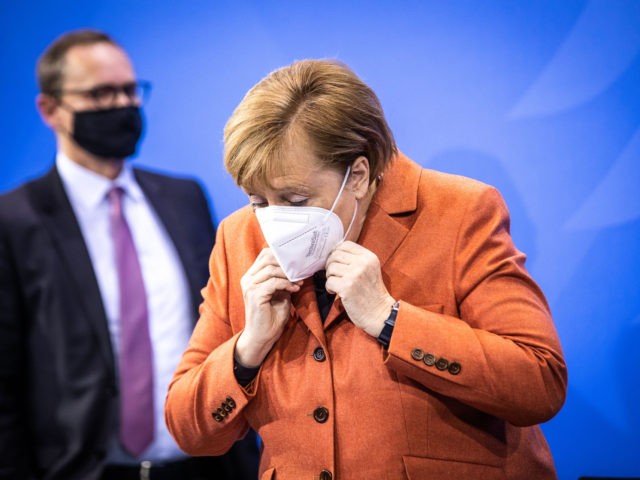Germany will enter a harsh coronavirus lockdown this week, with Angela Merkel’s government warning residents to not go out for Christmas shopping, Christians to not attend church services, and pupils to stay away from school.
The nationwide lockdown Germany is already under “was not enough”, German Chancellor Angel Merkel said as she introduced a series of new measures including closing schools, all non-essential shops, and even banning outright the sale of some seasonal celebratory items. The new lockdown begins on Wednesday (16th) and will last, with an exception for a quick break for Christmas itself, until January 10th.
Sunday’s announcement is the second full lockdown Germany has imposed in 2020, following another in April.
Shops have been targeted in particular as the German government blames Christmas shopping for a rising number of coronavirus transmissions. Britain’s Sky News cites Merkel’s comments specifically on the matter as: “I would have wished for lighter measures. But due to Christmas shopping, the number of social contacts has risen considerably… There is an urgent need to take action.”
Children are to be sent home from school for the duration of the lockdown for home learning, and the German government will even appeal to Christians to not attend church services, but instead watch them online. Church attendance will only be permitted if members of the congregation maintain social distancing — not easy on what is typically the busiest time of the year for churches. Bars and inns were already closed under Germany’s November lockdown — still in force — and will remain closed until January.
Germany is a federal state, and state governments gave enhanced details on the coming lockdown decided on Sunday to residents on Monday. Suddeutsche Zeitung reported the comments of Bavaria’s Prime Minister Markus Söder when he described the terms of the federally-imposed lockdown, noting among the exceptions to the shop-closure order were to be those selling food, medicine, and petrol.
The closure of retail businesses in the run-up to Christmas, traditionally the busiest and most profitable time of year for many, will come as a bitter blow despite the German government’s offer of financial support to companies impacted. As with other countries, the move will likely again push consumers towards online shopping giants, further swelling their profits.
A spokesman for the Bavarian Trade Association said local businesses expected to reap €14 billion in the run up to Christmas, but now “the Christmas business is over”, and its members expected to lose €150 million a day during the closure.
Ordinary Germans will suffer loss of their traditions in the coming weeks, too. Part of the package of lockdown measures bans outdoor drinking, meaning mulled wine, a staple of European festive celebrations, is cancelled for 2020. Explaining the prohibition, Merkel said people do not wear masks or socially distance properly while enjoying themselves with a cup of hot, spiced wine, so it had to go.
New Year’s Eve will be different, too. The lockdown also totally outlaws the sale of fireworks, a seasonal favourite in German cities. The policy may backfire, however. German newspaper Die Welt reports citizens love seeing in the New Year with pyrotechnics so much, some may turn to home-made or illegally imported fireworks, which it is feared could be dangerous.
Ironically enough, a law meant to keep people out of the hospital could end up seeing more admitted.
Nationwide, Germany’s coronavirus rate stands at around 169 cases per 100,000, compared to 65 in the United States.

COMMENTS
Please let us know if you're having issues with commenting.